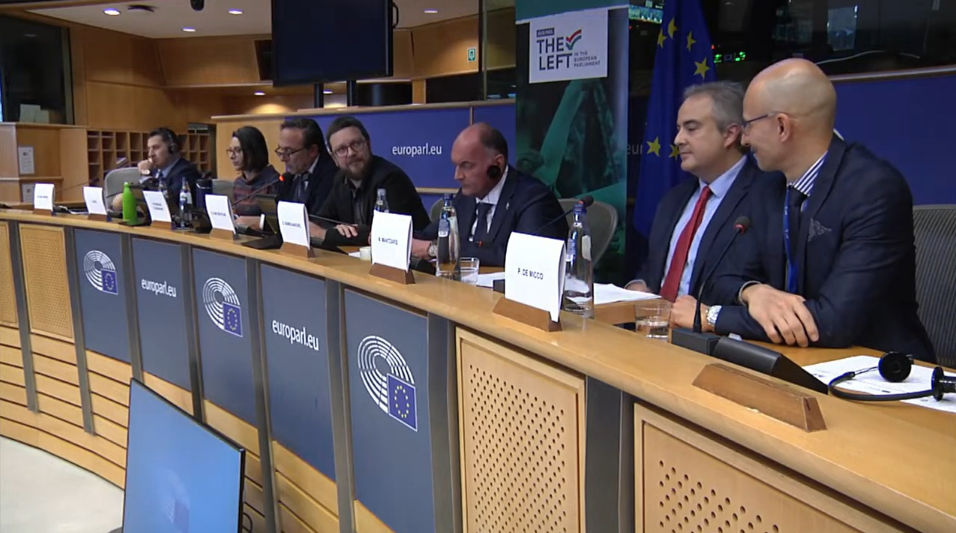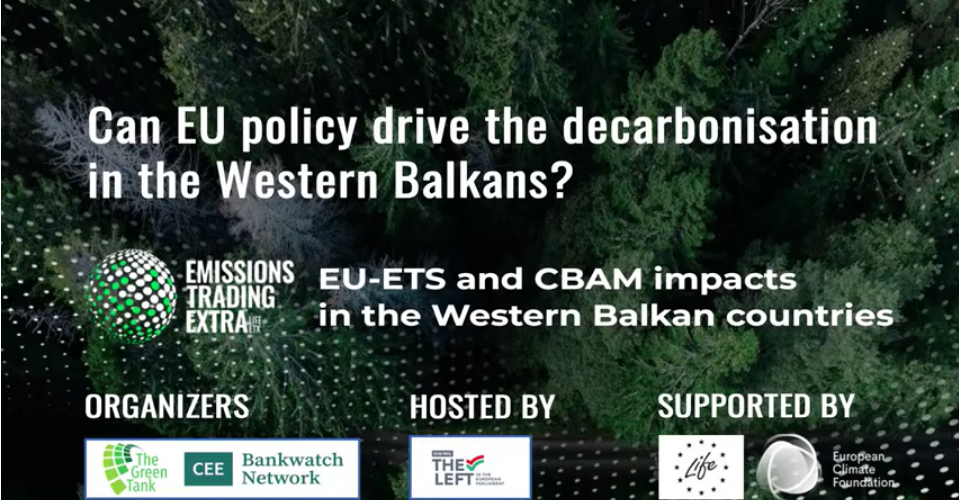JOINT PRESS RELEASE
The challenges that the new Carbon Border Adjustment Mechanism (CBAM) will bring to the Western Balkan countries were the focus of a panel discussion hosted by MEP Petros Kokkalis (the LEFT) and co-organised by CEE Bankwatch and the Green Tank that took place on Tuesday December 6 at the European Parliament.
The Western Balkan countries have been exporting significant amounts of electricity to the EU for years, produced, predominantly, by their heavily polluting coal plants. Since the Western Balkans do not participate in the EU Emissions Trading System (EU ETS), and most of the countries do not have a carbon pricing system of their own in place, electricity production costs have been low compared to the corresponding costs in the EU. However, this will change in the next few years due to the new CBAM Regulation, developed to put a price on the carbon embedded in imported goods from at least five sectors, including electricity.
This new EU climate policy instrument, established to create a level playing field between EU industries and their competitors in third countries, will clearly impact the Western Balkan countries, and especially their coal industry, as well as the local communities that are dependent on it.
The event brought together European-level policy makers, environmental groups and think tanks, mayors and representatives of local municipalities from the Western Balkans to advocate for stricter criteria for CBAM in order to accelerate decarbonisation in the Western Balkans through the establishment of new carbon pricing systems or the integration in EU ETS, as well as to give mayors from coal municipalities in the Western Balkans a platform to discuss their initiatives and to raise the issue of a Just Transition Fund for the Western Balkans.
The discussion was moderated by Sam van den Plas, Policy Director at Carbon Market Watch, and was organised as part of LIFE ETX, a project co-funded by the European Commission and the European Climate Foundation aiming at making the EU’s Emissions Trading System (EU ETS) work for citizens and the climate.

Petros Kokkalis, MEP, the LEFT, placed CBAM in the broader political context of the Fit for 55 package and underlined its potential to stimulate climate action outside the EU, thus contributing to the global efforts to urgently address the climate crisis. “The EU should take measures to support its financially weaker trading partners such as the Western Balkans and ensure that the necessary funds are in place to shift their electricity model towards clean energy, while also providing a safety net for the local communities in coal regions”, he concluded.
Pasquale De Micco, Policy Officer for Carbon Border Adjustment Mechanism (CBAM) at the European Commission’s Directorate-General for Taxation and Customs Union, presented the economic impacts of CBAM on Western Balkan countries with an emphasis on the power sector, based on the impact assessment accompanying the European Commission’s proposal for the CBAM Regulation.
Ioana Ciuta, Energy Coordinator at CEE Bankwatch Network presented the main findings of a new study on the power sector of the Western Balkan countries. “Coal has been the easy go-to solution for several governments since the crisis started, but the fact is that coal is no longer reliable and CBAM will only aggravate things. It’s crucial that Western Balkan countries receive the support needed to end their reliance on coal and fund a just transition”, she concluded.
Samir Kamenjaković, Mayor of Živinice, and Mirnes Bajtarević, Mayor of Kakanj, both from Bosnia and Herzegovina, outlined the challenges the local communities in coal regions face in transitioning away from coal, but also presented their initiatives and ideas for new economic activities that they consider essential for a just transition in the post-coal era.
“Local communities will face serious challenges with job losses as part of the transition away from coal, which needs to be addressed through new job opportunities in other sectors. We need targeted support for flagship projects, such as a geothermal district heating system for Kakanj. This and similar projects are examples of desirable investments in coal regions in transition in the Western Balkans”, stated Bajtarević.
Kamenjaković emphasised: “It is of paramount importance that a Just Transition fund is established, partially connected to carbon pricing, as it will help materialise the plans that are already in place for Zivinice, thus moving this municipality away from coal dependence”.
Nikos Mantzaris, senior policy analyst and co-founder at the Green Tank in Greece, presented the results of an analysis for a fair distribution of Just Transition Funds among Western Balkan countries. “The new CBAM Regulation will lead to a significant loss of revenue for the coal industry in the Western Balkan countries. Early planning for a Just Transition in coal regions and adequate funding are absolutely essential. However, the Western Balkans should avoid the mistakes made in designing the EU Just Transition Fund. A fair allocation must take into account the speed of transition away from coal for each country”, he stated.
Notes:
- You can watch the entire event here.
- You can read the study by CEE Bankwatch titled The Western Balkan power sector: between crisis and transition here.
- You can read the joint study by the Green Tank and CEE Bankwatch titled “A Just Transition Fund for the Western Balkan countries” here.
- You can read more about the LIFE-ETX project here.
For more information contact:
- Elena Psyllakou, Communications officer, The Green Tank, elena.psyllakou@thegreentank.gr, +30 6946 124 164
- Ioana Ciuta, Energy coordinator for the Western Balkans, CEE Bankwatch Network, ioana.ciuta@bankwatch.org, +40724020281, Twitter: @unaltuser
- Konstantinos Alexakos, Communications Officer for the Office of MEP Petros Kokkalis, cvalexacos@gmail.com



















































































































































































































































































































